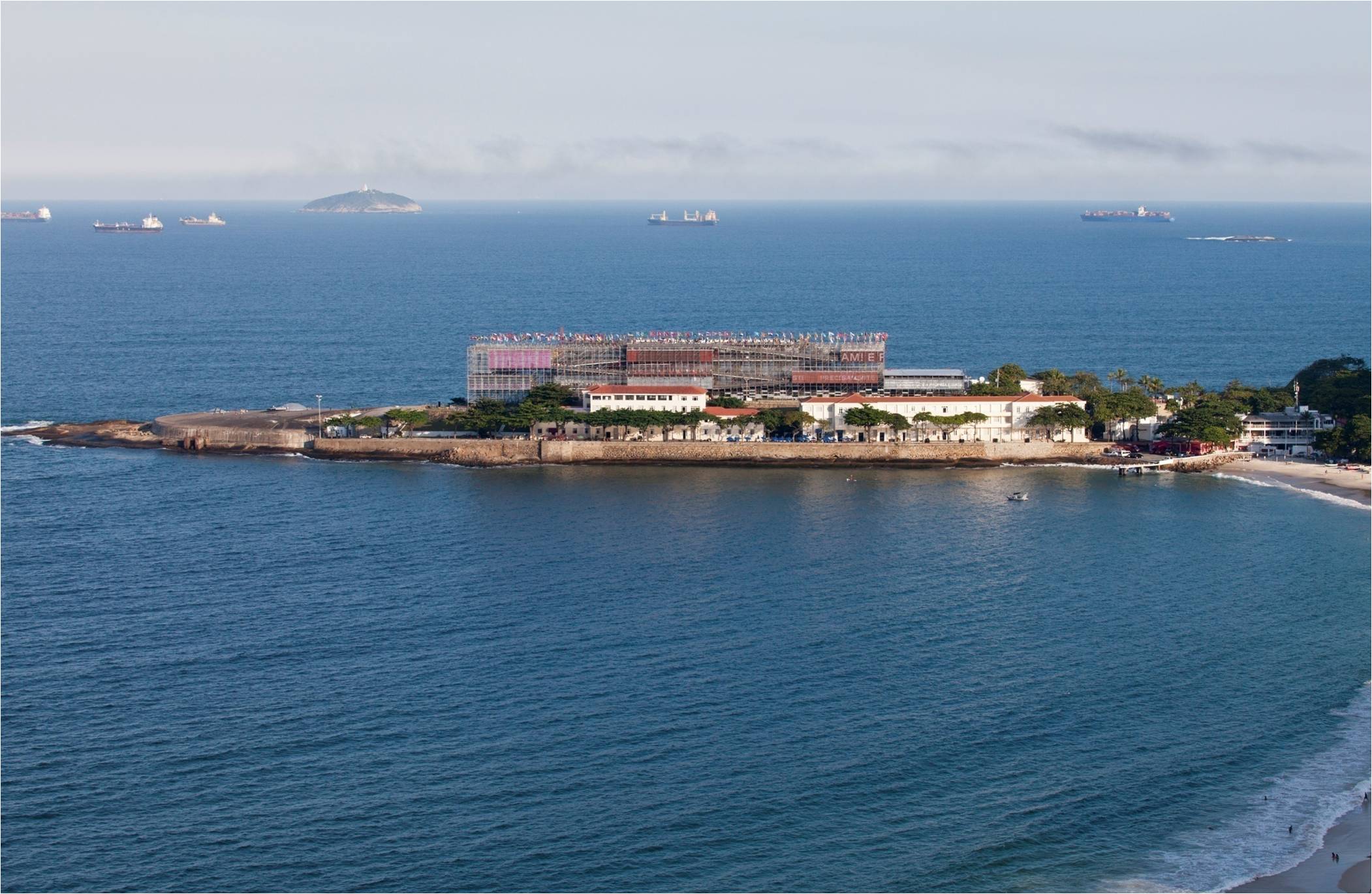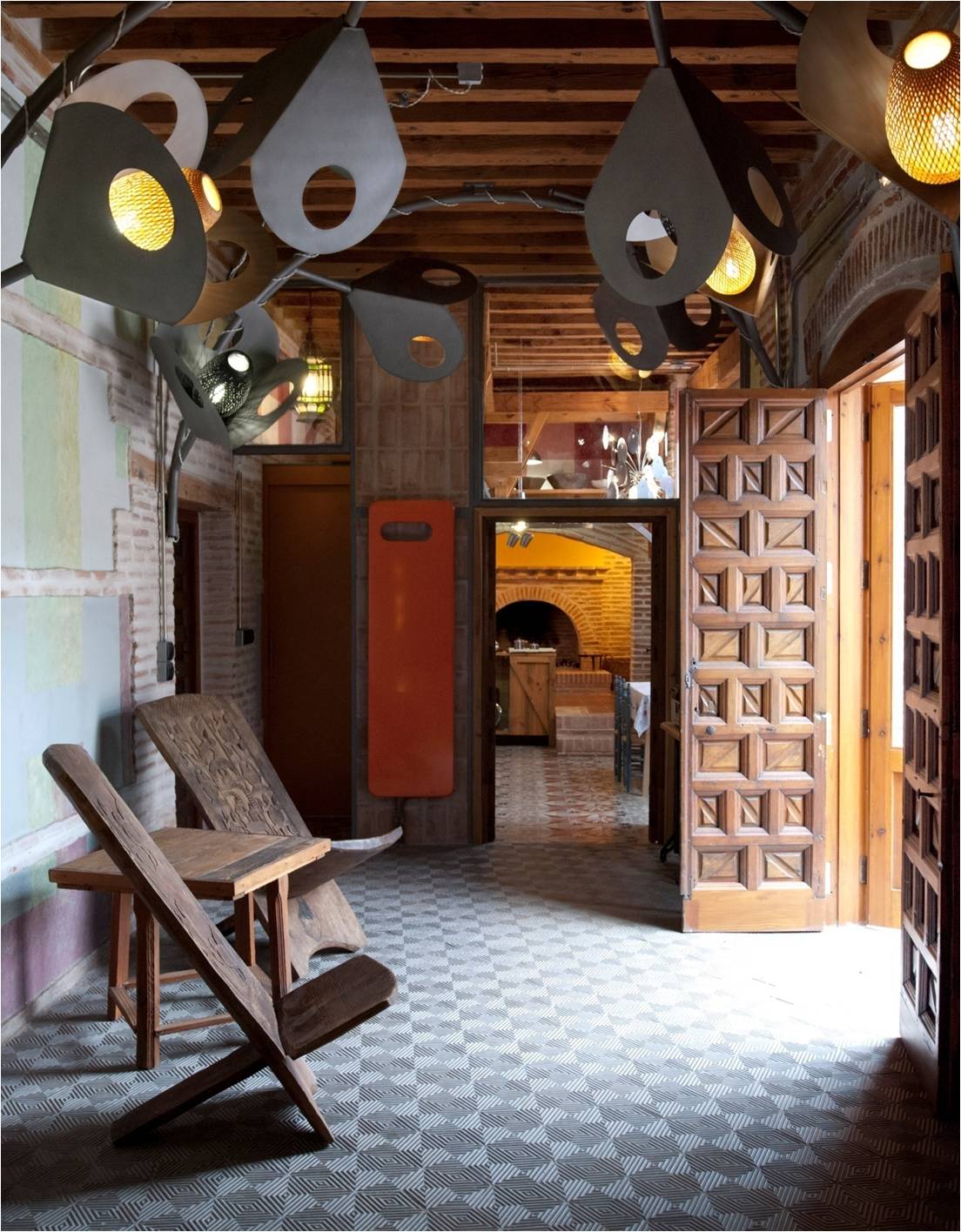Brazilian Architect Carla Juaçaba wins the arcVision Prize – Women and Architecture at its first edition.
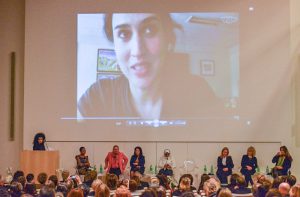 8th March 2013 – It’s the Brazilian architect Carla Juaçaba who has been named as the winner of the first arcVision Prize – Women and Architecture, the international social architecture award for female designers.
8th March 2013 – It’s the Brazilian architect Carla Juaçaba who has been named as the winner of the first arcVision Prize – Women and Architecture, the international social architecture award for female designers.
The Prize is a two-week research workshop and an amount of € 50,000, part of which may be devolved to social projects, at the discretion of the winner.
The Jury decided to particularly award the Humanidade 2012 pavilion project developed for Rio+20 (the UN conference on sustainable development), designed and built together with an artist, Bia Lessa.
The symbolic value of the pavilion, an impermanent structure, is heightened by the fact that Rio+20 was an important opportunity for a global assessment of what is being done or not being done to save the Earth from environmental disaster.
The Jury was composed of Shaikha Al Maskari, Vera Baboun, Odile Decq, Victoire de Margerie, Yvonne Farrell, Samia Nkrumah, Kazuyo Sejima, Benedetta Tagliabue, Martha Thorne and assisted by Stefano Casciani, the Scientific Director of the Prize, Carla Juaçaba embodies those qualities necessary in an architect of courage in approaching her profession, creativity in seeking unconventional solutions and enormous sensitivity to the context in which her works will reside.
Special Mentions
The Jury also awarded three Special Mentions, to Izaskun Chinchilla from Spain for her non conventional design approach, Anupama Kundoo from India for her skill in researching materials, and Siiri Vallner from Estonia for her sensitive interpretation of spaces.
The Prize winner was announced on March 7th in Bergamo.
“With this award we want to highlight the growing importance that female designers have been assuming in architecture in recent years and pay tribute to a “positive discrimination” in favor of women,” said Carlo Pesenti. “Hopefully, in sectors traditionally governed by men, women will come to assume a central role and overcome every form of discrimination or exclusion from decision making and production. Men and business need the energy and sensitivity of women to grow and achieve ever greater results.”
Carla Juçaba – Rio De Janeiro, Brazil – WINNER
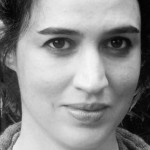
Carla Juaçaba
Carla Juaçaba embodies those qualities necessary in an architect of courage in approaching her profession, creativity in seeking unconventional solutions and enormous sensitivity to the context in which her works will reside. The Jury praised the functionality and appropriateness in her proposals to make sure that fully serve their purpose, and do so contributing to the beauty and quality of life of those who will use and inhabit her buildings. The Jury felt she embodies a “complete” architect, embracing all aspects of each commission: context, environment, nature, parameters, materials….
After reviewing projects of completely different types, the Jury highlighted the ability of Carla Juaçaba to successfully manage projects of diverse scales. A temporary structure, conceived with artist Bia Lessa, the Pavilion Humanidade 2012 for Rio+20 housed private events and a public exhibition on sustainability that received 220,000 visitors in two weeks. The Jury made special note of the elegant simplicity and functionality of the pavilion. By selecting normal scaffolding elements to construct the pavilion, the architect has creatively demonstrated her full attention to sustainability, by re-using existing materials available locally to create the structure and the walkways extending 170 meter in length of the pavilion, which will then be completely recyclable and re-usable again after dismantling.
The building formed a wonderful dialogue with the surrounding setting, enhancing the site while the spectacular nature and setting also enhanced the pavilion.
The Varanda House, constructed on a site where all trees were to be preserved, is a wonderful example of a “minimal house” that is an inviting home, with simple spaces and the delicate and inventive play of natural light and beautiful Brazilian landscape.
BIOGRAPHY
Born in 1976, since 2000, Carla Juaçaba developed her independent practice of architecture and research based in Rio de Janeiro, Brazil. Her office is currently engaged in both public and private projects, focusing on housing and cultural programs. Since undergraduate student she worked with the architect Gisela Magalhães of the Niemeyer’s generation, mostly in the area of exhibitions related to the Brazilian native arts and historical museums.
During her first year after college (2000) she worked jointly with another architect Mario Fraga on the project named “Atelier House”. Following that, a series of projects have been conceived such as the “Rio Bonito House” (2005), the “Varanda House”(2007), the “Minimum House” (2008),“Santa Teresa House” in its final stage (2012), and a couple of exhibition design.
Current works include the ephemeral pavilion conceived with the senior scenographer and theather director Bia Lessa, “Humanidade 2012” for Rio+20, the recent international meeting held in Rio de Janeiro, and also tow houses on the outskirt of Rio. Carla Juaçaba is constantly a part of the academic and teaching realms, as well as research studies, lectures, biennales, exhibitions and recently was the Jury at BIAU Bienal Ibero Americana in Madrid (2012).
She is currently teaching at FAU-PUC RJ Pontifícia Universidade Católica. Her work is focused on an intrinsic issue of the discipline: the poetics of tectonics, and its expressive potentiality.
Izaskun Chinchilla – Madrid, Spain – SPECIAL MENTION
 The jury really admires the courage of Izaskun Chinchilla who tries to open unconventional paths through researches and architectural education while being deeply concerned by a particular combination between social engagement, aesthetics and techniques to reinvent a new vision for ecological environment in her projects.
The jury really admires the courage of Izaskun Chinchilla who tries to open unconventional paths through researches and architectural education while being deeply concerned by a particular combination between social engagement, aesthetics and techniques to reinvent a new vision for ecological environment in her projects.
The realization of every project is transgressing architecture and art installation for embracing the social in public spaces.
The jury wanted to enhance her dynamism in breaking the limits and her strength to express it through drawings which have been influential on a new generation of young architects.
BIOGRAPHY
Graduated Architect from Universidad Politécnica de Madrid (Spain) in 2001. She has been running her own studio in Madrid since 2001. With a long and comprehensive experience in education, she is Senior Teaching Fellow and Researcher in Barlett School of Architecture (UCL London, UK). She has also taught at the Ecole Special (Paris, France) and at the HEAD University (Geneva, Switzerland).
She was Studio Professor in the University of Alicante (Escuela de Arquitectura Universidad de Alicante) from 2002 to 2007. At present, she is teaching at Madrid University (Escuela Técnica Superior de Arquitectura Universidad Politécnica de Madrid, Spain) and Instituto de Empresa (Madrid, Spain).
Her designer activity is accompanied by a research project called “Social and Aesthetic Repercussions of technical topics and solutions which take ecology into account” and that has taken her as visiting scholar to Columbia University in New York (2002), Ecole de Mines de Paris (2003) and Princeton University in New Jersey (2004) and also to the Institut d´Arquitectura Avancada de Catalunya (Barcelona), in a Postgraduate Master (2003-2007).
She is at the moment supervising construction of her project for a Mediatheque in Garcimuñoz Medieval Castle in Cuenca, Spain (a public cultural building including the refurbishment of the existing infrastructures with social purposes); the refurbishment of a vernacular house in Toledo, Spain, and other smaller projects.
She is also involved in the design of digital interactive exhibitions with social purposes, e.g. encouraging reading among young children (Fairytale Park Museography in Málaga) or appreciating the efforts after some sports (Centro de Arte Canal).
Anupama Kundoo – Tamil Nadu, India – SPECIAL MENTION
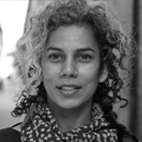 The Jury selected Indian architect Anupama Kundoo for a special mention for her capacity to focus to material research with a view of reducing the environmental impact of building technology.
The Jury selected Indian architect Anupama Kundoo for a special mention for her capacity to focus to material research with a view of reducing the environmental impact of building technology.
The Jury appreciated her project for Volontariat Homes and for Urban Eco-Community and praised her experiments in using many unconventional materials in ways appropriate to the context, as well as efforts at recycling.
Finally, the Jury liked her dedication when approaching the problem of affordability of construction and sustainability in all aspects.
BIOGRAPHY
Born in Pune, India, in 1967, married, two children. Practicing architect since 1990, having realized over a hundred built projects.
The practice demonstrates a strong focus on material research and sustainable architecture supported by extensive research and experimentation from the development of building technologies to building prototypes that are environmentally sound and socio-economically beneficial.
The projects range from planning and urban design to architecture and detail product design of building systems.
Siiri Vallner – Tallin, Estonia – SPECIAL MENTION
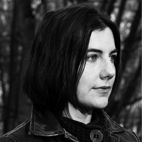 Siiri Vallner is one of the young fresh contestants who has caught the Jury’s attention. Dividing her work between two architectural practices, including the all women practice, KAVAKAVA, Siiri Vallner has completed structures for schools, sports and cultural activities which have become recognizable landmarks in Estonia’s new architectural scene.
Siiri Vallner is one of the young fresh contestants who has caught the Jury’s attention. Dividing her work between two architectural practices, including the all women practice, KAVAKAVA, Siiri Vallner has completed structures for schools, sports and cultural activities which have become recognizable landmarks in Estonia’s new architectural scene.
The Jury felt that her Downtown Gym embodied sensitive interpretation of the site as well as contributing to the immediate surroundings. Both the ground works and the elevation relating to the existing building draws the outdoor space into the interior of the gymnasium space. The gymnasium is sensitively wrapped in an inventive and crafted brick wall.
BIOGRAPHY
The Jury believed Vallner deserves special mention as this multi-purpose work successfully brings out clarity, simplicity, flexibility and courage while it harmonizes with its natural surroundings and the neighborhood.
It is both flexible and courageous in blending the old and the new: Vallner’s work exhibits many of the qualities we want to encourage in the built environmentSiiri Vallner (born in 1972) set up her own practice after studying architecture and urban planning in Estonia, Denmark and the US. She has carried out a broad array of works, mostly public buildings.
Recently she has been working on different social projects – short-term accommodation for temporarily homeless people in Tallinn, foster homes in Kuressaare and a public sauna in Tallinn.
Siiri Vallner has won many awards including the first Estonian Young Architect Award in 2009. She is a studio instructor at the Estonian Academy of Arts, dept of architecture. Besides other projects, she was co-editor of the landscape architecture issue of the Estonian architectural review Maja in 2006 (together with Katrin Koov).



